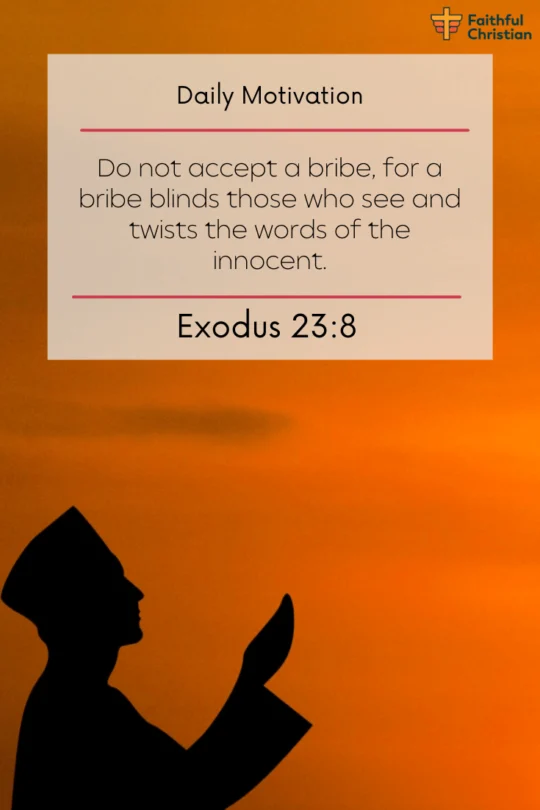We all need money for our daily needs.
We need money to take good care of our families and ourselves.
But there is a limit to everything.
In our quest for more money, we should always act like Christians.
Contentment and selflessness are two priceless qualities of a faithful Christian.
We should not be greedy and selfish with money.
Thankfully, there are bible verses about money and greed.
These verses go straight to the point to remind us that we should be satisfied with what we have.
And what about covetousness? What does the bible say about being greedy about other people’s money?
God is unhappy when we are selfish and jealous.
I have put together bible verses about greed and money.
Read and be blessed.
Recommended for you
- Thou Shalt Not Lie: 12 Bible Verses
- Prayer For contentment in life
- Powerful Scriptures About Self Control
- 33 Bible verses about love of money is the root of all evil
Bible Verses about Money and Greed
Proverbs 15:27

The greedy bring ruin to their households,
but the one who hates bribes will live.
In the revered book of Proverbs, we discover a profound insight, “He who is greedy for gain troubles his own house, but he who hates bribes will live” (Proverbs 15:27). This is not a mere warning; it’s a portrait of greed’s consequences. But what does this verse tell us today?
Greed, defined as a self-centered yearning for wealth or power, invites problems when unchecked. Trouble, as used in the verse, suggests significant disorder, even chaos.
Now, let’s consider a vivid biblical example: Ananias and Sapphira. Their story, as recorded in Acts 5:1-10, is a powerful illustration of the dangers of greed.
This couple, instead of being transparent about the price for which they sold their property, decided to keep back a portion of the money for themselves. Their greed, however, didn’t just lead to trouble; it led to their death.
From a modern perspective, remember the 2008 financial crisis. Rooted in excessive greed, this global economic calamity affected millions. The common thread in these examples? Greed, leading to devastation at both personal and societal levels.
Greed can also permeate our spiritual lives. James 4:3 states, “When you ask, you do not receive, because you ask with wrong motives.” Here, it’s evident that even our prayers can bear the taint of greed. We must remain mindful of our intentions, ensuring they align with virtuous principles.
Even Jesus cautions us in Luke 12:15 against all forms of greed. He reminds us that life is not about material wealth; it’s about love, righteousness, and compassion.
So, what’s the antidote? The Bible instructs us to live righteously and be content. Spiritual growth, generosity, and prioritizing relationships over riches can help us combat greed. In doing so, we can foster homes and societies of tranquility, free from the tumult of greed.
In sum, let’s keep Proverbs 15:27 in mind as we journey through life. Rejecting greed in favor of righteousness and contentment allows us to lead peaceful lives. After all, a life free from greed’s chaos is a life truly worth living.
Proverbs 1:19

Such are the paths of all who go after ill-gotten gain;
it takes away the life of those who get it.
Greed, the insatiable yearning for wealth, can destroy lives. Proverbs 1:19 paints a vivid picture of this, depicting ill-gotten gains as a beast stealing life itself. Wealth achieved dishonestly does not enhance life but diminishes it, robbing us of joy and fulfillment.
This sentiment echoes in 1 Timothy 6:10. Love for money, a facet of greed, leads to manifold evil. Greed blinds us, pulls us away from our faith, and inflicts self-made sorrows. It’s a chilling picture that Paul, the Apostle, presents.
Ecclesiastes 5:10 further deepens our understanding of greed. The scripture uncovers the paradox of wealth – those who love money will never have enough. Greed is a hunger that remains perpetually unfulfilled. It’s an echo chamber of insatiable desire, blurring our view of real satisfaction.
Thinking about these verses reminds me of Judas Iscariot. For a mere thirty pieces of silver, he betrayed Jesus. His avarice propelled him to a tragic end – a stark reminder of how greed can lead to catastrophe.
History repeats itself, and greed manifests in the modern world too. The fall of Enron Corporation stands testament to this. Once a giant, it crumbled under executive avarice and deception. This debacle led to job losses, trust erosion, and a shaken global business community.
Yet, the Bible guides us away from this destructive path. It’s not wealth that’s evil, but the dishonest pursuit and love for it. We are guided to lead lives of contentment, appreciating what we have. As Paul advises Timothy, we ought to be content with essentials like food and clothing.
In essence, the Bible’s wisdom urges us to resist greed, advocating for a life of simplicity and contentment. It’s a guiding light as we tread our financial paths, leading us to a fuller, richer life.
Exodus 23:8

Do not accept a bribe, for a bribe blinds those who see and twists the words of the innocent.
Money, greed, and selfishness are timeless issues addressed head-on by biblical teachings. Central to this discussion is Exodus 23:8, a divine prohibition against accepting bribes.
God, through this verse, underscores the danger of such acts. Notably, the verse highlights the receiver’s corruption rather than the giver’s, demonstrating the extensive damage that bribery inflicts on moral integrity.
To bolster our understanding, we turn to Deuteronomy 27:25. The message here is stark: anyone accepting a bribe to harm an innocent person stands cursed. This stark pronouncement amplifies the importance of the Exodus verse, emphasizing the gravity of corruption and deceit.
We find a broader view in Proverbs 17:23, which reveals how wicked individuals embrace secret bribes to warp justice. This verse intertwines with our primary theme – a divine call to reject greed and corrupt acts, especially those tied to wealth.
These scriptures serve as a roadmap for ethical conduct, highlighting a sweeping biblical principle: God condemns corruption and deception. As followers of these teachings, we’re tasked with walking a path of righteousness and integrity.
A vivid example can be found in the story of Samuel’s sons from 1 Samuel 8:3. Instead of following their father’s righteous footsteps, they chose a path marred by bribery and distorted justice. This narrative underscores the destructive influence of bribery on individuals and communities.
But this issue isn’t confined to ancient texts. I recall the FIFA corruption scandal, a stark reminder of greed’s potential to shake even modern institutions to their foundations. In this saga, football officials were swayed by bribes, twisting the governance of the world’s most-loved sport.
To sum up, the Bible’s message is crystal clear: bribery, corruption, and greed have no place in our lives. We’re called to lead lives of integrity, fairness, and righteousness, serving as an antidote to the poisonous grasp of greed and selfishness.
By aligning ourselves with these teachings, we can effectively navigate the challenging landscape of financial ethics.
Jeremiah 17:11

Like a partridge that hatches eggs it did not lay
are those who gain riches by unjust means.
When their lives are half gone, their riches will desert them,
and in the end they will prove to be fools.
Jeremiah 17:11 warns us of a crucial reality about wealth. The verse compares a person who amasses dishonest wealth to a partridge hatching eggs it did not lay.
This vivid metaphor sheds light on the futility of such a pursuit. Like the partridge, such a person will find that ill-gotten wealth brings no lasting satisfaction.
This metaphor mirrors the rich fool in Luke 12:20-21. This man, blessed with bountiful crops, thinks only of earthly gains. He plans to build larger barns, hoard his surplus grain, and bask in the comfort of wealth.
His life, however, ends abruptly. His amassed treasure? Useless. And that’s because his life wasn’t “rich” towards God.
Paul’s words in 1 Timothy 6:9 build on this idea. He warns that the desire for wealth is a trap. It can lead to ruin and destruction, turning the pursuit of wealth into a perilous journey.
A real-life example of Howard Hughes further underscores this. Despite being incredibly wealthy, Hughes lived in fear and isolation. His riches could not purchase happiness or satisfaction, mirroring the emptiness of the partridge’s nest.
The love of money, not wealth itself, is the issue. It’s the greed that drives us to amass more, leaving us empty. Therefore, it’s crucial that we refocus our pursuits. True wealth lies in spiritual richness – in love, kindness, and generosity.
In my experience, chasing material wealth leads to an empty nest. It’s the spiritual riches that yield lasting satisfaction. I believe this is where our focus should lie.
As you navigate through life, I urge you to value spiritual wealth above earthly riches. Remember the partridge’s empty nest and don’t let that be the story of your life.
Keep your pursuits in check, and aim for a life that is rich toward God. This is the path to true, lasting wealth.
Deuteronomy 16:19

Do not pervert justice or show partiality. Do not accept a bribe, for a bribe blinds the eyes of the wise and twists the words of the innocent
When we delve into the Bible, we unearth a treasure: justice. Deuteronomy 16:19 rings with timeless advice, cautioning us against perverting justice and showing partiality.
It says, “Do not pervert justice or show partiality.” These words carry a universal appeal, urging us to promote fairness and ward off greed’s dangerous allure.
If we dig deeper, Proverbs 24:23 amplifies this sentiment. It succinctly advises, “To show partiality in judging is not good.” This verse spotlights impartiality, the cornerstone of true justice.
Turning to Leviticus 19:15, we uncover a similar directive. It warns against bias, partiality, and the corruption of justice.
The verse reads, “Do not pervert justice; do not show partiality to the poor or favoritism to the great, but judge your neighbor fairly.” This recurring theme underscores the Bible’s emphasis on justice, honesty, and righteousness.
Let me draw upon a tale from 1 Kings 21 to illuminate these principles. It narrates the story of King Ahab and Jezebel, who schemed to seize Naboth’s vineyard. Their abuse of power mirrors the dangers of greed and the distortion of justice.
In modern times, the Volkswagen emissions scandal mirrors this biblical narrative. Here, a corporate giant twisted truth for personal gain, violating the trust of millions. This real-world incident is a sobering reminder of the perils of compromising truth for monetary gain.
The teachings of Deuteronomy, Proverbs, and Leviticus are not historical artifacts; they are timeless gems. They caution us against greed and urge us to uphold justice. They remind us that honesty and righteousness are treasures beyond any monetary wealth.
As we journey through life, let us strive to embody these values, understanding that they are the true wealth worth pursuing.
Isaiah 33:15

Those who walk righteously
and speak what is right,
who reject gain from extortion
and keep their hands from accepting bribes,
who stop their ears against plots of murder
and shut their eyes against contemplating evil—
The Bible shares valuable insights about wealth. Isaiah 33:15 details the traits of a godly person: walking righteously and rejecting unjust gain. It doesn’t glorify riches, but the character behind it.
Let’s explore Zacchaeus’s story from Luke 19:1-10. Once a deceitful tax collector, his encounter with Jesus changed everything. He pledged to donate half his wealth and reimburse four-fold any wrong earnings. It’s a story of redemption through honesty.
Psalm 15:5 adds another layer to our understanding. It presents a righteous person as one who doesn’t exploit others for personal gain. They don’t lend money with interest, nor accept bribes. It’s not about wealth accumulation; it’s about equity and fairness.
Proverbs 10:2 complements this idea: “Treasures gained by wickedness do not profit, but righteousness delivers from death.” Here, the focus is on how you earn, not what you earn. Righteous conduct, not ill-gotten wealth, is celebrated.
Now consider Bill Gates. A billionaire, he uses his wealth to fund global humanitarian efforts. His story exemplifies how wealth can positively impact others when managed righteously.
To sum up, the Bible doesn’t denounce wealth. It guides us on how to approach it: with righteousness, honesty, and generosity. It inspires us to use resources to uplift others, not for selfish gains.
In life, wealth is just a piece of the puzzle. The way we deal with it is what truly counts. Weaving wealth with integrity creates a meaningful life, reflective of the godly character in Isaiah 33:15.
So, let’s learn from these biblical teachings and strive for meaningful prosperity. This journey may be challenging, but I assure you, it’s worth it.
It’s a step towards navigating money, greed, and selfishness in a righteous manner. And trust me, every step counts.
Isaiah 33:16

16 they are the ones who will dwell on the heights,
whose refuge will be the mountain fortress.
Their bread will be supplied,
and water will not fail them.
Imagine, for a moment, the richness that can’t be touched – a wealth that isn’t measured in coins or banknotes. That’s what Isaiah 33:16 offers. It paints a picture of secure, sustained living for those who are righteous. This is real wealth – protection and provision that outlasts worldly riches.
Now, let’s delve into Psalm 37:16. It tells us that a little in the hands of the righteous outweighs much wealth of the wicked. It’s a profound statement, isn’t it? True wealth isn’t about bank account balances. It’s about the heart’s condition.
In Proverbs 15:16, we find a similar idea. Here, we’re told that a humble life lived in reverence to the Lord surpasses great wealth with unrest. Money, without spiritual grounding, is a breeding ground for turmoil. It can’t compare to peace, can it?
I’m sure you’re familiar with Job from the Bible. He lost everything, but his faith never wavered. Job’s story shines a spotlight on the value of spiritual wealth over material possessions. His trust in God was a treasure that no disaster could steal.
Mother Teresa, the well-known humanitarian, led a simple life, but her impact was huge. She lacked material wealth but was rich in love and compassion. Her life was a testament to the truth that fulfillment isn’t found in wealth, but in selfless service.
As we journey through life, remember, the value of our righteousness exceeds our material wealth. Aligning with the wisdom of Isaiah 33:16, we find the blueprint for a life of true wealth. This is a journey of discovery, finding where our heart truly lies, as Jesus said in Matthew 6:21.
In closing, let’s embrace the idea that wealth is more than possessions. It’s about living righteously. In doing so, we find lasting peace and security. This, my friend, is the most valuable investment we can make.
Proverbs 20:21

An inheritance claimed too soon
will not be blessed at the end.
Imagine life as a steady climb, rather than a sprint. This concept rings true, especially for our finances. Proverbs 20:21 warns us: “An inheritance claimed too soon will not be blessed at the end.”
What does this mean? Quick wealth, like a fast inheritance or windfall, often leads to a bad end. It’s not the money that’s the problem, but the missed lessons of patience, hard work, and wisdom that come with slow, steady earning.
Picture Jesus’s parable of the prodigal son in Luke 15:11-32. This tale is a living testament to Proverbs 20:21. The young son, impatient for wealth, demanded his inheritance early. He squandered it through extravagant living, learning the hard way the downsides of hasty wealth.
This situation isn’t unique to the Bible. We see it in the real world. Many lottery winners face life-altering challenges because they aren’t ready for sudden wealth. Stories of bankruptcy, sadness, and regret are far too common.
Ecclesiastes 7:8 guides us towards patience: “The end of a matter is better than its beginning, and patience is better than pride.” Wealth isn’t just a hefty bank account; it’s about the journey there. The lessons we learn and the person we become are just as vital.
I encourage you to see life, and wealth, like a marathon, not a sprint. A sprinter’s burst of speed won’t sustain us in life’s marathon. We must pace ourselves, earning wealth slowly, steadily, honestly.
The Bible teaches that the right path to financial security isn’t the fastest, but the most enlightened. It encourages virtues of patience, wisdom, and understanding.
The dream of quick riches can be alluring, but remember Proverbs 20:21, the prodigal son, and the real-life stories of lottery winners. As I’ve learned, it’s not about the speed, but the direction.
Proverbs 28:16

A tyrannical ruler practices extortion,
but one who hates ill-gotten gain will enjoy a long reign.
Isn’t Proverbs 28:16 insightful? This verse paints a vivid image of leadership. It describes two types: oppressive rulers lacking understanding, and those who detest ill-gotten gain. This speaks volumes about greed.
We can draw parallels in the world around us. Leaders without understanding often become oppressive. Their unbridled greed leads to unjust accumulation of wealth.
The biblical story of King Solomon illustrates this perfectly. Despite his wisdom and wealth, Solomon’s heart wandered away from God. He lost his moral compass, veering into oppression. A lack of righteousness and a clouded understanding can lead to a downfall, even for the wisest.
Ezekiel 22:12 speaks of crimes committed out of greed – usury and extortion. Does this not reflect today’s world, where unchecked greed has made many stray off the moral path?
Habakkuk 2:9, paints a grimmer picture. It’s a dire warning against unjust wealth accumulation. It echoes the ethos of Proverbs 28:16 and is a clarion call to honesty.
I’m reminded of the tale of Bernard Madoff, a Wall Street mogul. Madoff, driven by greed, orchestrated a mammoth Ponzi scheme. It ended in catastrophe, leading to his downfall. His story is a reminder that unchecked greed can lead to devastation.
The Bible, through these verses, calls for understanding, justice, and fair dealing. It’s not just about comprehending right and wrong, but about living righteously. It’s a call to avoid greed and oppressive behavior, and to embrace fairness.
In essence, the teachings of the Bible, especially Proverbs 28:16, guide us away from greed. They encourage us to embrace understanding and justice, irrespective of our societal roles.
As we do this, we not only secure our lives, but also help build a just society. It’s a timeless lesson that resonates even in the modern world. So, let’s strive to lead lives of understanding and righteousness, shall we?
1 Corinthians 5:11

But now I am writing to you that you must not associate with anyone who claims to be a brother or sister[a] but is sexually immoral or greedy, an idolater or slanderer, a drunkard or swindler. Do not even eat with such people.
Diving into 1 Corinthians 5:11, we find a cautionary tale about greed. Paul, the Apostle, sternly tells the Corinthians to avoid greedy individuals. Herein lies a lesson that’s relevant to us all.
Greed, Paul implies, is moral corruption. Like a tidal wave, it can sweep us off our feet, drowning us in a sea of materialism. Paul’s warning is both clear and urgent.
Ephesians 5:5 paints a similar picture. It equates greed with idolatry. It’s like putting money on a pedestal, treating it as a deity. This kind of worship is precisely what Paul cautions against.
Let’s look at 1 Timothy 3:3. It outlines overseers’ qualifications and states they must not be lovers of money. It’s a valuable lesson for anyone with influence or authority. It reminds us to place values over valuables.
We find a poignant example in the biblical tale of the rich young ruler (Mark 10:17-22). He obeyed all commandments but couldn’t part with his wealth to follow Jesus. This story shows us how greed can hinder spiritual growth.
Elizabeth Holmes, founder of Theranos, provides a contemporary example. Her greed for success led to deceit. It resulted in not just personal downfall but also caused harm to those who trusted her.
The Bible teaches us to reject greed. Instead, it guides us to be rich in good deeds. This principle is a cornerstone of Christian discipleship.
Money is not inherently evil. It’s our attitude towards it that counts. It can be a tool for good or lead to destruction.
The choice is ours. Paul’s teachings remind us that true wealth isn’t about worldly possessions. It’s about the richness of faith. I find that a compelling message. And I believe it’s something we can all learn from.
Recommended for you
- Thou Shalt Not Lie: 12 Bible Verses
- Prayer For contentment in life
- Powerful Scriptures About Self Control
- 33 Bible verses about love of money is the root of all evil
More Bible Verses about Greed and Selfishness
Matthew 16:26
Proverbs 28:22
Proverbs 23:6
1 Timothy 6:9
Proverbs 28:20
Job 27:16-17
Mark 8:36
James 1:9-10
James 1:11
Philippians 3:7-9
Luke 9:25
Romans 6:21
Psalm 49:17
Luke 12:19-20
Luke 12:15
Hebrews 13:5
1 Timothy 6:6-8
1 Timothy 6:9-10
Psalm 119:36-37
Proverbs 16:16
Proverbs 15:16
2 Timothy 3:2-3
Ecclesiastes 5:10-16
2 Peter 2:3
Colossians 3:5
Psalm 62:10
Mark 7:22
Habakkuk 2:9
Ephesians 5:3-5
1 Corinthians 6:10
Jeremiah 6:13
Luke 21:34
Proverbs 23:4-5
Psalm 10:3
Recommended for you
Be content in all circumstances.
Please don’t take my word for it.
There are numerous scriptures in the bible that admonishes us to be selfless and contented.
The love of money is the root of all evil.
It does not bring glory to God in any way.
God is more concerned that we are saved from this sinful world.
And that means we obey his commandment and love one another.
The love of money makes us visionless of the secret things of life.
We become fixated on the quest to get rich by all means.
Don’t get me wrong; there is nothing wrong is success and wealth.
If there is, God wouldn’t have blessed Solomon with riches in his time.
But we must be wise and understand the world.
God wants us to be selfless and not greedy.
He wants us to love one another with anything he has blessed us with
He understands one thing — that all we have is vanity.
The moment we die, they all disappear.
The story of Ananias and Saphira is a story that teaches us to be truthful and not greedy.
They sold their possession and only returned a part to the apostles.
In the end, they were sentenced to death by God.
They didn’t get the chance to spend the rest of their greed.
They left it behind and were buried.
In the end, their selfishness was all in vain.
Everything we own is for a while, and when we die, they become meaningless to us.
May God take away all forms of greediness in you and open your hearts to understanding the truth about the love for money. Amen.
Frequently Asked Questions
What does the Bible say about being greedy with money?
In the Bible, 1 Timothy 6:10 (NIV) warns of the perils of money-related greed. It doesn’t condemn money per se, but the love of it. This love can steer us away from faith, affecting our relationships and life’s values.
What does the Bible say about being selfish with money?
The Bible advises against money-related selfishness. Paul, in 1 Timothy 6:17-19 (NIV), instructs the wealthy to be generous. Here, the Bible doesn’t condemn wealth, but the lack of generosity.
What does the Bible say about selfishness and greed?
Luke 12:15 (NIV) outlines the Bible’s stance on greed and selfishness. It’s not our possessions, but our character and service to God that define life. Proverbs 28:25 (NIV) also notes, greed can stir up strife, while trusting in God brings enrichment.
What does the Bible say about misuse of money?
Mismanagement of money is frowned upon in the Bible. In Matthew 25:14-30, the Parable of the Talents condemns unproductive use of resources. It stresses the importance of wisely utilizing what we have, including money.
What is the sin for money?
The Bible sees the excessive desire for wealth or greed as a grave sin. Colossians 3:5 (NIV) advises to suppress our earthly desires, including greed, equating it to idolatry.
Why is greed for money a sin?
The Bible perceives money-related greed as sinful because it can lead to idolatry. Ecclesiastes 5:10 (NIV) states, “Whoever loves money never has enough; whoever loves wealth is never satisfied.” It can lead us to act harmfully towards others.
Does money make us greedy and selfish?
The Bible cautions about the potential perils of wealth. 1 Timothy 6:9 (NIV) warns, the desire for wealth can lead us into harmful desires, potentially resulting in ruin.
What are consequences of greed?
Proverbs 15:27 (NIV) indicates that greed can lead to spiritual, emotional, and interpersonal issues. It brings ruin to households, but those who reject bribes will live. Greed can also lead to discontentment and exclusion from God’s kingdom (Ephesians 5:5).
What happens to a greedy person?
Proverbs 1:19 (NIV) suggests that a greedy person may face negative outcomes, including harm to relationships, spiritual health, and physical or emotional wellbeing.
What are the Bible verses about greed and selfishness?
Numerous Bible verses caution against greed and selfishness. These include Luke 12:15, Ephesians 5:5, and Proverbs 28:25. They warn of the dangers of materialism, exclusion from God’s kingdom, and conflict.
What is the punishment for greed in the Bible?
Ephesians 5:5 (NIV) warns that the punishment for greed is often spiritual and eternal. Those who persist in greed risk being cut off from God.
Can you provide some Bible verses on greed and corruption?
Verses such as Exodus 23:8 (NIV) in the Bible discuss greed and corruption. This verse advises against accepting bribes, warning that they can blind the wise and twist the words of the innocent.
Are there any proverbs in the Bible that address greed and selfishness?
Proverbs like Proverbs 11:26 (NIV) address greed and selfishness. It emphasizes the societal effects of hoarding and the blessings that accompany generosity.
Who are some notable individuals portrayed as greedy in the Bible?
Judas Iscariot, who betrayed Jesus for thirty pieces of silver (Matthew 26:14-15), is an infamous figure of greed in the Bible. His greed eventually led to his downfall and suicide (Matthew 27:3-5).
Is there a specific Bible verse that addresses greed and death?
Proverbs 1:19 links greed to potential death or destruction. The Bible hints at the damaging outcomes of greed.
